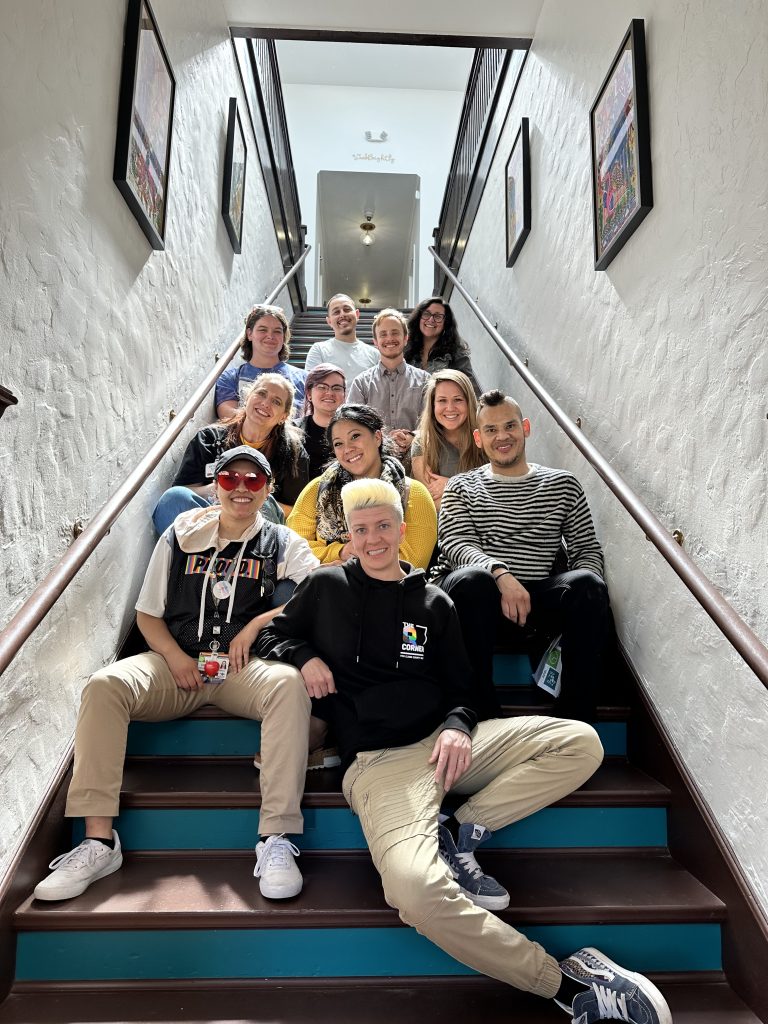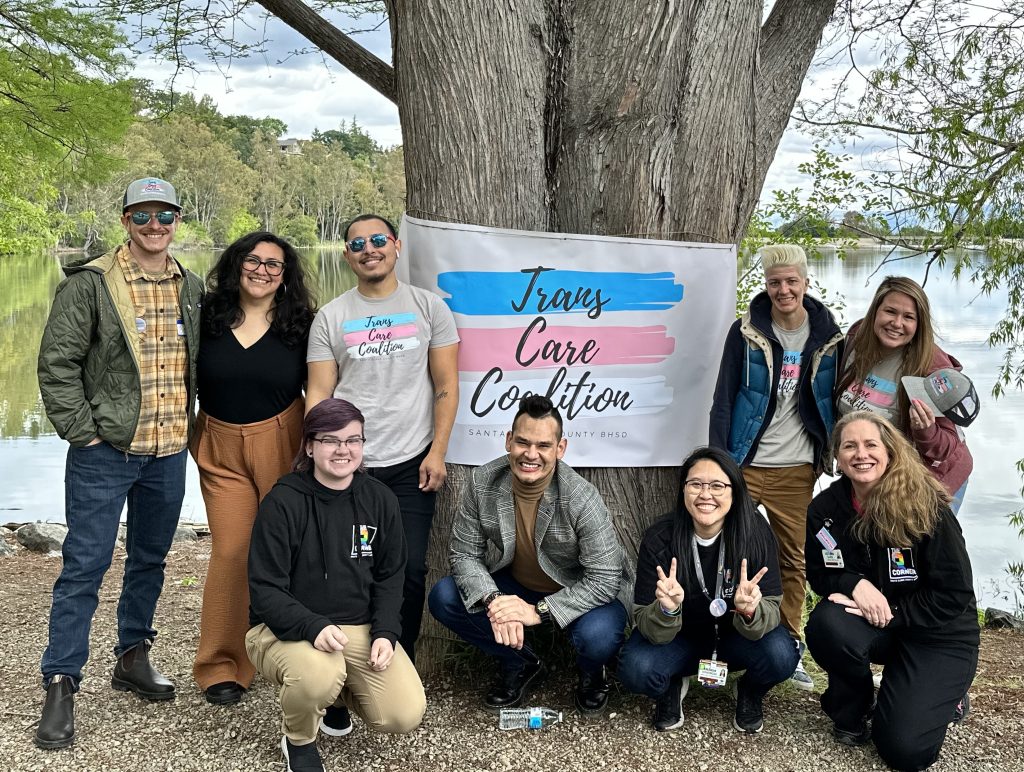The County of Santa Clara’s 2013 Status of LGBTQ+ Health Report revealed a significant unmet need for health services tailored for the LGBTQ+ community, including behavioral health services. Community members reported experiencing a shortage of mental health providers who are LGBTQ+ knowledgeable and affirming. Two-thirds of LGBTQ+ survey respondents stated that there are not enough mental health professionals who are adequately trained to work with LGBTQ+ clients.
Aware of these needed services, Supervisor Ken Yeager submitted a referral in October 2018 requesting the administration survey community stakeholders to identify and prioritize what services should be included in an LGBTQ+ Health and Wellness Center. He asked that the administration consider such services as individual and group therapy, family and partner counseling, peer counseling, substance use treatment services, HIV/STI testing, linkage to housing resources, older adult programs, resources for employment, and nonclinical cultural activities and programs. Supervisor Yeager stipulated that a report back be given on December 18, the last meeting of the year and his last meeting as a County Supervisor, due to term limits. This way he could make sure that his vision for the Center was being set in motion.
Somehow staff managed to meet the two-month deadline. The response was delivered at a board meeting by Maribel Martinez, the manager of the Office of LGBTQ+ Affairs and Alicia Musquiz, a senior manager in the Behavioral Health Services Department (BHSD). According to their report, the project was enthusiastically received at all levels of the community design process. Further, all participants, including community-based organizations, underscored the need for more services focused on the LGBTQ+ community. BHSD staff began pursuing the goal of creating programs to better serve the LGBTQ+ community, including creating trainings and consultation opportunities to improve the quality of all services for LGBTQ+ folks.
The Q Corner
The first program was named The Q Corner, a peer focused, peer run program to connect LGBTQ+ folks with direct support, resources, and community connection, and other practitioners with opportunities to increase knowledge in LGBTQ+ affirming care. With funds from the Mental Health Services Act (MHSA)—a state program funding behavioral health services—The Q Corner hired its first peer support worker, Emmett Marsh, in 2019. In January 2020, The Q Corner staff moved into its San Jose office on E. Santa Clara St. It planned to open in March 2020, but then the COVID-19 pandemic hit. The Q Corner pivoted to provide its services online and established a social media presence to share information on resources and build community virtually.



Since its inception, the Q Corner has centered direct one on one and group peer support services and assistance to navigate LGBTQ+ affirming resources and referrals. This means LGBTQ+ community members can talk to people with whom they are comfortable sharing information without fear of rejection or judgment. A number of the groups and activities that the team offers are done in collaboration with Caminar’s LGBTQ Wellness Program. The team also works closely with the Gender Health Center to ensure people connect to services for their medical and behavioral health needs and with youth programs like LGBTQ Youth Space and the Bill Wilson Center, so teens and young adults can be connected to youth focused programming and supports. They refer people to other community run LGBTQ+-focused support groups through LGBTQ+ community centers, youth programs, survivor support organizations, and culturally specific service providers. In addition to groups, referrals, and events, The Q Corner helps people with legal name and gender marker changes. It also provides the community with gender affirming garments like binders for chest compression and gaffs for tucking, as well as trans tape which can be used for either. Cost is often a barrier, but The Q Corner is able to provide them to the community for free.
The Q Corner also offers support and assistance to caregivers, services providers, and other allies to access information on resources and best practices. This allows more people to be knowledgeable about available services and affirming care, in order for them to share that information with others and treat everyone with respect. Additionally, The Q Corner provides training for County and County-contracted agencies so they can better support the LGBTQ+ community.
The Q Corner training team, led by Management Analyst Isabella Garcia, creates foundational SOGIE (Sexual Orientation and Gender Identity and Expression) 101 trainings that are offered monthly through the BHSD Learning Partnership training department and customized trainings for schools, housing service agencies, and other community services. The team works closely with the Family Acceptance Project, where family members share their real lived experience of supporting their child through accepting behaviors. This is in addition to the Queer Intentional Peer Support training for folks who work in peer capacities, Gender Wheel Training focused on decolonizing gender and creating gender inclusive environments, Palo Alto University for an LGBTQ+ Clinical Academy for master’s level behavioral health providers, and TransYouth Care for comprehensive care for trans and gender diverse youth. In early 2021, the Trans Care Coalition was formed, as a think tank comprised of representatives of a dozen plus different agencies and programs, to make recommendations and create tools to improve gender affirming care locally.
In July 2021, The Q Corner office finally fully opened, and the team was able to host drop in hours three times a week, meet with individuals and groups in person, start hosting community building events, and participate in resource fairs and outreach activities. Fast forward to 2023, and The Q Corner team is now twelve people strong. They created the Harm ReduQion Project, a team within The Q Corner focused on helping people connect to substance use treatment services and overdose prevention supports, such as naloxone and fentanyl testing strips. The Q Corner now attends as many outreach opportunities as possible – at high schools, community colleges, small markets, wellness fairs, and LGBTQ+ community events, because they know the importance of visibility, and bringing access to information to where folks are at. They feel there is validation in the public learning about services available to the LGBTQ+ community.
The Mental Health Gender Affirming Care Clinic
Gender affirming care can be hard to find, incredibly expensive, and difficult to access. It was when Dr. Jules Chyten-Brennan from the Gender Health Center and Alicia Musquiz from Behavioral Health saw the high number of gender-diverse people experiencing barriers to accessing gender affirming behavioral health care within Santa Clara County, that they, along with other community members, advocated for the creation of a specialty mental health gender affirming care clinic. It will operate within the Behavioral Health Services Department, with hopes to begin services in early 2024. The MHSA-funded gender-affirming clinic is being created and implemented by the new Program Manager, Ben Geilhufe, a queer, transgender clinician and educator. It will also employ three master’s level Behavioral Health Clinicians who will provide individual, group, and family therapy for transgender and gender-diverse clients. In addition to treatment services, Clinicians will write letters of support for gender-affirming medical interventions like hormone therapy and surgeries in collaboration with the Gender Health Center. Staff will also include two Mental Health Peer Support Workers, who will support with care coordination and referrals to resources. These team members will also be able to go to other health appointments and help clients advocate for themselves within medical, mental health, and other service settings. This is key because of the medical discrimination that exists and how some people have experienced medical trauma in other systems, making them hesitant to access services and advocate for themselves. The team will be rounded out with a Psychiatrist, a Licensed Psychiatric Technician, a Licensed Clinical Supervisor, and two Health Service Representatives.
The need for such a clinic cannot be understated. Geilhufe said that gender diverse folks of all ages often face staggering amounts of stigma, harassment, and discrimination, which strongly correlates to significant mental health disparities. Discrimination can include loss of job or housing due to bias, denial of medical service due to bias, bullying by fellow students or coworkers, and physical and sexual assault due to bias. Geilhufe said the national transgender discrimination survey released in 2016 had over 27,000 respondents, and nearly half reported high acuity mental health experiences including suicide attempts. While there are more and more community-based organizations around the country that offer mental health services for gender-diverse clients, there are very few county run behavioral health clinics that specifically serve gender-diverse folks of all ages. This new clinic is a much-needed service that can be a template for other county behavioral health systems to develop more gender affirming care.
Geilhufe is also working on building capacity for other county clinics within the County of Santa Clara so that gender-diverse folks have options as to where to go. Program and practitioners throughout the County will be able to access the clinic staff and discuss their cases and get support. In fact, Geilhufe has already begun a monthly gender affirmative clinical consultation group, open to all clinical providers in Santa Clara County.
Musquiz, Geilhufe, Garcia, Marsh, and the rest of their teams are working to ready a new community space: colleQTIve, which will house both the upcoming and coming Gender Affirming Care Clinic and will become the home of The Q Corner. Once again, Santa Clara County is a beacon for all in the LGBTQ+ community. Being queer is not always easy, even in states like California where support can be available. For transgender, nonbinary, and gender diverse people living in states that are criminalizing them and their families, life can be doubly hard. Here in Santa Clara County, they will find love, support, and a place of belonging.